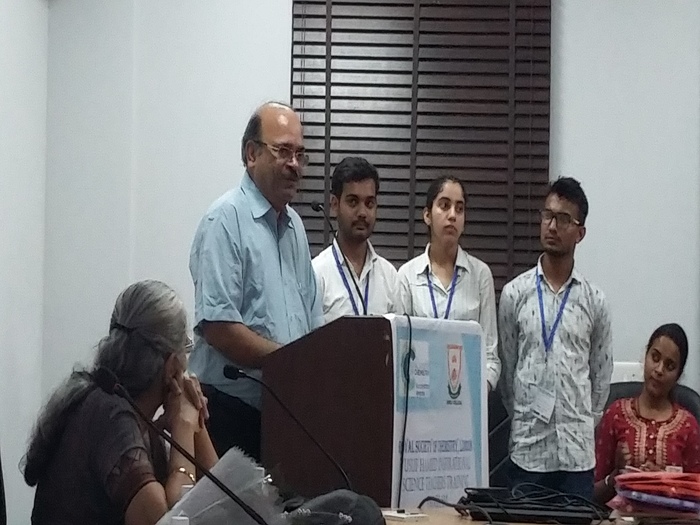Y.H. Inspirational Teacher Development Programme
NPSC in collaboration with the Royal Society of Chemistry RSC (London) and the Association of Chemistry Teachers ACT (c/o Homi Bhabha Centre for Science Education (TIFR) Mumbai), held a two-day Y. H. Inspirational Teacher Development Programme for school teachers at Hindu College, University of Delhi, on 18 and 19 July, 2018. Our Ms. Nausheen Wasi, attended the event along with nearly 67 teachers from various schools of Delhi-NCR.
The aim of this teacher development programme was to give teachers new tools for delivering engaging and effective lessons. The session also focused on imparting active learning techniques for implementation in classrooms to help students develop their knowledge and enthusiasm for chemistry.
[gallery link="file" order="DESC"]
Dr. Neera Sharma, assistant professor of chemistry at Hindu College, warmly welcomed the participants to the mega conclave. She then invited Mr. B.B. Sharma, IPS, Science Educator to light the inaugural lamp. In his address, Mr. Sharma laid emphasis on the importance of experiments in chemistry as well as the need for skill development in the subject.
The next eminent speaker, Dr.Brijesh Pare, vice-president ACT, addressed the assembly on the need for making the learning of science easy and entertaining for students. He encouraged all to ponder over Could learning science be fun? He advised the teachers to remain updated with the latest discoveries in the field. He urged them to instruct students using innovative methodologies, such as - relating topics to daily life, demonstrations, history, humour, analogies, scientoon and serendipity examples.
Dr. Pares talk was followed by a workshop on Towards active learning techniques' which was conducted by Ms. Jaya P. Swaminathan, Teacher Developer at RSC. The teachers were divided into groups and engaged in several learning activities to extend their repertoire of teaching techniques. For example, show-me board, concept maps, DARTs, tarsia grids/puzzles and card sorting. The engagement in these activities helped the participants evaluate the usefulness of definitions in chemistry and enhance lesson planning using active learning strategies.
The workshop, post lunch, focused on understanding chemical reactions and equations using games, such as ionic jigsaws, bingo, connect four, dominoes and word search. Through these games, teachers were able to explore ideas as also search for resources to help students write word equations, formulae and chemical equations.
Thus, Day One ended on a fruitful note with much food for thought for the participating teachers.
On Day Two, Dr. Brijesh Pare provided an insight into the discovery and applications of Fullerenes. He discussed the importance of comprehension- based questions leading to analytical development amongst children. He shared some sample questions to drive home his point.
Thereafter, Ms. Jaya P. Swaminathan highlighted the important safety rules to be observed in the laboratory, such as the use of lab coats and goggles, using small quantities of chemicals, and measures to be taken in case of fire or accidental spills.
Since all learning is incomplete without a hands-on experience, the teachers attempted some practical chemistry in the college laboratory. Forming groups of eight, they performed several demonstrations like making an indicator ( China rose), micro-titration using plastic syringes, electrolysis using pencils, displacement reactions, extraction of iron from matchstick etc.
The last workshop of the session commenced with a discussion on the particle nature of matter and activities related to it - model tube, Cartesian diver, particle cards, and simulations. The teachers were able to appreciate the common misconceptions and difficulties students experience in understanding the particle nature of matter. They were asked to use diagnostic questions as well as employ a range of active-learning techniques for effective teaching of the concept.
The valedictory ceremony was conducted by Mr. A. P. Sharma, Principal, Birla School, Qatar. On an edifying note, he asked the teachers to be the best version of themselves and reflect the power of resilience in their lives. He stressed the need for both teachers and students to think out of the box.
In a nutshell, the programme aimed at bringing out the learner in each teacher, enabling him/ her to use skills learnt in conceiving of new activities, conducting them in the class to make chemistry more meaningful, and sharing them with other participants.
The teachers' appreciated the intensive training session and resolved to put into practice the innovative techniques learnt by them during these two days. Teachers were awarded certificates of participation.
Ms. Nausheen Wasi.













